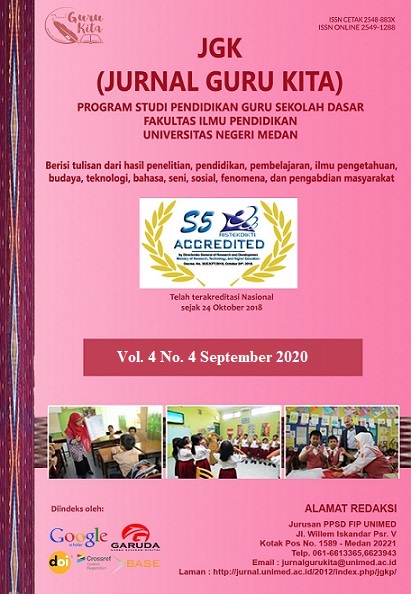PENGARUH KOMPETENSI DOSEN DAN LINGKUNGAN KERJA PADA KINERJA DOSEN DENGAN MOTIVASI SEBAGAIVARIABEL PEMEDIASI DI MASA PANDEMI
DOI:
https://doi.org/10.24114/jgk.v7i1.40308Keywords:
Competence, Work Environment, Motivation, and Performance.Abstract
The Effect of Lecturer Competence and Work Environment on Lecturer Performance with Motivation as a Mediating Variable in the Pandemic Period. This research is motivated by the atmosphere and conditions that the world is experiencing at the moment the Covid-19 pandemic. This outbreak has had a major impact on many aspects, especially learning. The author conducted research on the effect of competence and work area on performance by using motivation as a mediating variable during the pandemic. The survey will be tried on lecturers who have taught up to 124 respondents during the pandemic. The illustration-taking method used is a targeted illustration and the information collection used is a 5-step Likert scale questionnaire distributed online in the form of Google Forms. Information was analyzed with SPSS for descriptive analysis and SMART-PLS for SEM analysis. The results of this research show that competence and work area indirectly affect performance through motivation as a mediating variable. Competence and work area have a positive impact on performance. Competence and work area have a positive influence on motivation. Motivation has a positive effect on performance.References
Agha, S. (2012). Effect of Core Competency on Competitive Advantage and Organizational Performance. International Journal of Business and Management, Volume 7, Nomor 1, 192-203.
Almusaddar dkk The Influence Of Knowledge, Satisfaction, And Motivation On Employee Performance Through Competence International Journal of Business and General Management (IJBGM) ,2018
Byars, L.L., and L. W., Rue, (2005). Human Resources Management, Mc GrawHill, New York, hal. 275
Donatus Adi Kurniawan, Guswandi & Akhmad Sodikin, The Effect Of Competence And
Motivation On Employee Performance Through Employees Capabilitieson Pt. Binasinar Amity, INTERNATIONAL JOURNAL OF RESEARCH SCIENCE & MANAGEMENT, (2018).
Hair, J. F., Hult, G. T., Ringle, C., & Sarstedt, M. (2017). A Primer on Partial Least Squares S.
Mangkunegara. (2010). Evaluasi Kinerja SDM. Bandung: PT. Refika Aditama.
Martini dkk, The Influence of Competency on Employee Performance through Organizational Commitment Dimension, IOSR Journal of Business and Management (IOSR-JBM) Volume 20, Issue 2. Ver. VIII (February. 2018).
Mulang hastuti, The Effect of Competences, Work Motivation, Learning Environment on Human Resource Performance, Golden Ratio of Human Resource Management, Vol.1, Issue. 2 (2021).
Muray, Peter. (2003). Organizational Learning, Competencies and Firm Performance:
Emperical Observations. The Learning
Pratiwis & Yunianto, Kepuasan Kerja Sebagai Mediasi Pengaruh Motivasi, Lingkungan Kerja Terpersepsi Terhadap Kinerja, Prosiding SENDI_U 2018 ISBN: 978-979-3649-99-3,2018.
Rachmawati, Tutik & Daryanto. (2013). Penilaian Kinerja Profesi Guru dan Angka Kreditnya. Yogyakarta: Gava Media.
Rahardjo, S. 2014. The Effect of Competency, Leadership and Work Environment Towards
Motivation and Its Impact on The Performance of Teacher of Elementary School in Surakarta Ciity, Central Java, Indonesia. International Journal of Advanced Research in Management and Social Sciences ISSN 2278-6236
Sedarmayanti. (2009). Sumber Daya Manusia dan Produktivitas Kerja. Bandung: CV Mandar Maju.
Siagian, Sondang P. (2008), Manajemen Sumber Daya Manusia. Jakarta: PT. Bumi Aksara
Spasikita.kemdikbud.go.id
Shelina dkk, Home Learning in Times of COVID: Experiences of Parents, Journal of Education and Educational Development 7(1), 09-26, 2020.
Spencer, Lyle M. and Signe M. Spencer. 1993. Competency Work: Model for Superior Performance. John Wiley and Sons, Inc.Organization. Vol. 10, 305-313
Sugiyono. (2017). Metode Penelitian Kuantitatif, Kualitatif, dan R&D. Bandung: Alfabeta. Structural Equation Modeling (PLS-SEM): Edition 2. California: SAGE.
sman. (2009). Motivasi Dalam Bekerja Karyawan. Jakarta: Gramedia
Widiasarana Indonesia.
Wibowo. (2010). Manajemen Kinerja (edisi ketiga). Jakarta: Rajawali Pers
Downloads
Published
How to Cite
Issue
Section
License
Authors published with the JGK (Jurnal Guru Kita) agree to the following terms:
- Authors retain copyright and grant the journal the right of first publication with the work simultaneously licensed under a Creative Commons Attribution License (CC BY-SA 4.0) that allows others to share the work with an acknowledgment of the work's authorship and initial publication in this journal.
- Authors are able to enter into separate, additional contractual arrangements for the non-exclusive distribution of the journal's published version of the work (e.g., post it to an institutional repository or publish it in a book), with an acknowledgment of its initial publication in this journal.
- Authors are permitted and encouraged to post their work online (e.g., in institutional repositories or on their website) prior to and during the submission process, as it can lead to productive exchanges, as well as earlier and greater citation of published work. (See The Effect of Open Access)













